#Central American flavors
Explore tagged Tumblr posts
Text
Pollo Campero in Canoga Park: A Guatemalan Culinary Adventure with Irresistible Chicken Delights

Nestled in the heart of Canoga Park, Pollo Campero stands as a beacon of Guatemalan culinary excellence, inviting patrons on a flavorful escape into the world of fried and grilled chicken delights. As a counter-serve chain with roots in Guatemala, this establishment has become a local favorite, enchanting taste buds with its unique blend of spices and authentic Central American flair.
A Taste of Guatemala: Pollo Campero's Origins and Heritage
Before delving into the gastronomic journey, it's crucial to comprehend the rich heritage of Pollo Campero. Established in Guatemala in 1971, this beloved chain has expanded into an international sensation, bringing the vibrant flavors of Central America to communities worldwide. Canoga Park is privileged to host one of these culinary gems, providing locals and visitors alike with a passport to Guatemala's culinary landscape.
Signature Chicken Creations: Fried and Grilled Perfection
At the core of Pollo Campero's menu are its signature chicken creations, crafted with a secret blend of spices passed down through generations. Whether you prefer the crispy perfection of fried chicken or the succulent tenderness of grilled options, each bite is a symphony of flavors paying homage to Guatemala's culinary traditions. Accompanied by a variety of sides, from yuca fries to plantains, the menu promises a delightful fusion of textures and tastes.
Beyond Chicken: Exploring Pollo Campero's Diverse Menu
While chicken takes center stage, Pollo Campero offers a diverse menu catering to various preferences. Vegetarians and seafood enthusiasts can also find satisfying options, ensuring everyone can partake in the culinary adventure. From hearty salads to savory empanadas, the menu reflects the restaurant's commitment to providing a well-rounded and inclusive dining experience.
Family-Friendly Atmosphere: A Gathering Place for All
Pollo Campero in Canoga Park isn't merely a place for a quick meal; it's a gathering place for families and friends. The warm and inviting atmosphere encourages patrons to linger, share stories, and enjoy the simple pleasures of good food in good company. The restaurant's commitment to hospitality creates a welcoming environment that encourages customers to return for more.
Catering and Events: Bringing Pollo Campero to Your Celebrations
For those seeking to elevate their gatherings, Pollo Campero offers catering services, bringing the flavors of Guatemala to special events and celebrations. Whether it's a birthday party, corporate event, or family reunion, the catering options enable hosts to share the joy of Pollo Campero with their guests, creating a memorable and delicious experience.
Pollo Campero in Canoga Park is more than a fast-food destination; it's a portal to the vibrant culinary traditions of Guatemala. Whether you're a fan of their renowned chicken or eager to explore diverse menu offerings, a visit to Pollo Campero promises a savory adventure capturing the essence of Central American cuisine.
#Canoga Park#Pollo Campero#Guatemalan cuisine#Central American flavors#culinary adventure#family-friendly#diverse menu
0 notes
Text
I know the respective fandoms of DC and Miraculous Ladybug have a certain disdain for MLxDC fics but I think there's a potential for fics where Luka leaves Paris and just keeps traveling to different US cities because he keeps figuring out secret identities and he's just this 15 year old kid growing increasingly frustrated and exasperated at how badly everyone hides their identities and he just has to pretend to be oblivious even tho it's Their Fault for being Bad At Secrets and shouldn't adults be better at this??????
#he goes to central city and he's like ah yes a city with an actual adult hero#surely he will be able to keep his identity a secret#and then that very same day he's at the bank setting up an american bank account and captain cold tries to rob it#and the flash saves the day as he does#and everything's great and dandy and secretive#but then#BUT THEN#he has to go to the police station about some paperwork for his witness statement (idk its fanfic just Write Something yk?)#and some guy laughs in the back of the precinct#and luka is like huh. that sounds like flash's laugh when he laughed at his own cold pun yesterday.#and he looks at the laughing guy and he's like oh hey they have the same jawline too. and same basic build. and god DAMN IT!!!!!!#literally just turning him into wes weston from my own fanfic which like. yeah i like the same concept in different flavors soooo#not a surprise#dcxmlb#dc x mlb#mlbxdc#luka couffaine
114 notes
·
View notes
Note
What did you think of the first episode of The Regime? I'm not sure what to make of it yet.
Neither am I—I really hope that it comes into its own and doesn't rely as much on the Veep and Succession house blend. Kinda digging Elena and Herbert's Kronk and Yzma thing, though.


#girl in cookie monster pajamas and her simp familiar is a dynamic of all time#one thing i loved about the death of stalin is that iannucci didn't just copy paste a satire of american or british politics into 1953#he demonstrated an understanding of a distinct flavor of soviet-era satire—a chimera of literal and figurative gallows humor#i hope we get to see some of that here#that is to say—i hope it employs central europe as more than a set dressing and plays with cultural and historical context#anonymous#assbox#the regime
50 notes
·
View notes
Text
Peppercorns (source of black, green, and white pepper) are completely different from Sichuan pepper! Sichuan pepper is a citrus, and the effect is numbing/tingling, not hot.
Which makes me curious. Pepper, originally from India, traveled all over Eurasia, but I've really only heard of Sichuan pepper used in Chinese cuisine. My experience is bound to be colored by the fact that I'm American, and the US first out-right banned importing Sichuan pepper, then required it be heat treated, because it IS a citrus and they were paranoid about introducing diseases that might hurt US citrus agriculture.
Real, non-heat-treated Sichuan pepper is back on the menu in the US, but after decades of absence or functional absence (heat-treating pretty much kills the the numbing effect and a lot of the flavor), people who aren't super familiar with the cuisine don't even notice it's missing from 'Sichuan' dishes.
Any food history nerds out there know if Sichuan Pepper made it's way to other cuisines? And if not, why not? All the classically-spicy things traveled as fast as humans could get our paws on them!
Well I would give a medieval peasant some spaghetti.
#Sichuan Pepper#I have high end stuff from two different sources right now#and let me tell you#the difference in the numbing power from what I could get 10 years ago is mind blowing#from 'huh I think there's something' to 'whoops can't feel my tongue'#it's great!#culinary history#also in the notes#someone mentions that china didn't have black beans#are they under the delusion that fermented black soy beans are the same as new-world black beans?#or are South/Central American black beans important in Chinese cuisine in some way I've never heard of?#if you're thinking 'black bean sauce' you are not going to get that flavor with poor Phaseolus sorry#they are delicious in their own way but the princess is in another castle
75K notes
·
View notes
Text
Dracula Daily Prep: Gather Your Paprikash!

It's that time of year again. Even as we speak, Jonathan Harker has departed for Transylvania, and the unhallowed halls of Castle Dracula. And as he makes his way towards that foreboding country, he will encounter a singular, most enticing of dishes: Paprika Hendl, or as we might know it better, Chicken Paprikash!
This traditional Central European dish explodes in popularity each May as we all gather around our virtual mess hall to enjoy the spirit of this most influential of gothic novels. Perhaps you yourself are considering throwing together a pot this year? Well, if you are, let this be your guide.
So, first, let's discuss the most important of the ingredients here: authentic hungarian paprika. Now, the recipe I first used last year called only for Sweet Paprika, but I personally found that version to be a little bland. I'm remedying this by adding some Hot Paprika as well. However, this is just my personal experimentation. Hungarian Hot Paprika can in fact be very hot, so if you're not comfortable with anything too spicy, feel free to opt only for the Sweet Paprika.
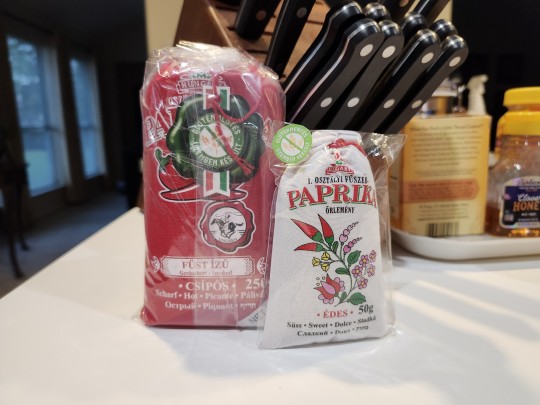
(Both of these I had to order online.)
Next, is another very important addition. As youre gathering your basic cornerstones of cooking (namely yellow onion, roma tomato, and garlic for this recipe) you may find yourself passing up on something that could vastly improve your dish. I'm talking, of course, about Hungarian Wax Peppers. These peppers range in heat, from meak and mild to slightly hotter than you'd average jalapeño. As per instruction, you should only use one. But on my end, I found the single pepper to be a little underwhelming, and I had trouble picking out it's flavor. So, this year, I'll be using two of them.
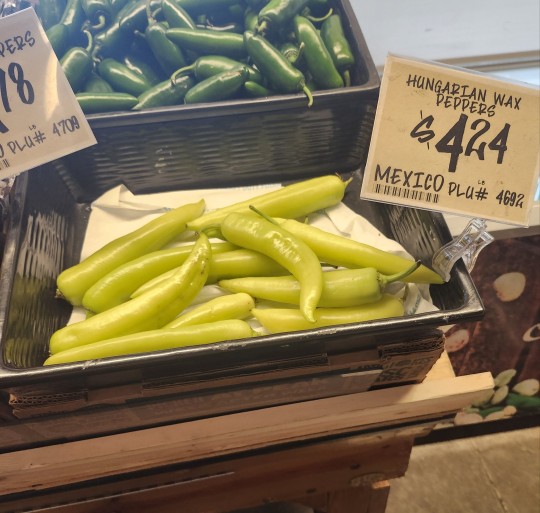
I got these from Central Market, an upmarket gorcer on Westheimer. They're a cousin of HEB, and you can find one or two in every major city in Texas. If you're elsewhere, try an alternative like Whole Foods, or try to find a European or International food market in your area.
Next, let's talk chicken. You can't have Chicken Paprkiash without the chicken, after all.

You're going to want to go with dark meat cuts for this. Traditionally the dish would use a mix of legs and thighs. Personally, I suggest using only the thighs, which you'll want to get bone-in and skin-on. The thigh provides a flater surface for browning than the leg, as well as more meat.

(A note on food safety, raw chicken will usually only last 2-3 days in the fridge. So you'll want to grab that fairly close to the day you're actually cooking this. If not, you can do what I'll be doing, and sticking it in the freezer until about 24 hours before I start cooking.)
So, as you gather your meat, produce, and spice you're probably asking yourself, "what on Earth am I going to be eating this with?" And the answer to that is spaetzle! A popular dumpling present in lots of Central European cooking, this is exactly what you need to tie this all together.

Now, while you should be able to find some in the international isle of most major grocers, you might also have to visit an international food store, or perhaps something more upmarket. If none of these options work, then there are a variety of other side dishes that work just as well. Egg noodles are a very popular choice, and in my very American attempt last year, I found that mashed potatoes work especially well.
Now that you've got all these things together, you're very nearly done. All that's left is the thickener. Paprikash is thickened using a blend of flour, heavy whipping cream, and sour cream. We'll get onto preparing this mixture in my post on actually cooking the paprikash, but until then, acquiring them should be a cake walk at any place food items are sold.
Now that will conclude the actual grocery list for just the Paprikash itself, but I do have one more pointer on how to really liven up this meal. Now, if you're under 21 or if perhaps you take after our dear, depraved, beloathed Count

Then you can skip this next bit. As a wine professional myself, I find that a well paired glass can add a tremendous flare to nearly any already great dinner. In the case of something like Chicken Paprkiash, and keeping with the Central European theme, I could hardly think of a better match than a good German Pinot Noir, also known as a Spatburgunder. Pinot from Germany typically has a very light body and a refreshing acidity that plays very well with the rich and creamy sauce of Chicken Paprikash. The palate of earth and red fruit should always pair nicely with the smoke of the paprika, as well as being a general good partner for any chicken. I myself am going with this 2020 Rheingau from August Kesseler.
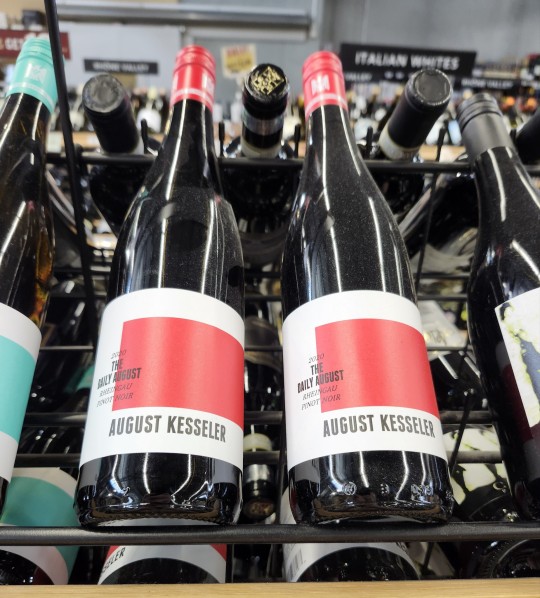
And with that, we are done! Hit those checkout isles and make sure to get home before dark. Terrible things have sway over the world once the sun has gone down. So if the crowd does keep you locked up until nightfall, make sure to graciously accept any crucifixes given to you by kindly, elderly grandmothers and inn keepers. But whatever you do, make sure to pop in on Friday, when I'll be sharing a step by step guide on taking these ingredients and turning them into a dinner that will make our good friend Jonathan go red as a fire truck!
Happy Dracula Week everybody!

730 notes
·
View notes
Note
The debate that's older than I am.
That being; "Eowyn's cooking is awful enough to kill grown men, or is Rohan's cultural food that strange to foreners?"
So, I'm curious what you think a regular meal is like in Edoras for one. I live in Midwestern America, and a staple is plain but calorie rich food to keep you full longer and to deal with the cold better, and sometimes I wonder if Rohan could be the same way. Of course, making outsiders not used to such a "strange" diet.
But it could also go the other way that people in Edoras (especially Eowyn) do not know what a nice meal looks like, and will continue to cook horrors for generations to come.
Do you have any thoughts? :).
Ah, the Éowyn stew scene….one that I would have on my short list to “discuss” with Sir Peter if the opportunity ever came to pass!
I think if you accept that scene as canonical, then the only thing you can reasonably infer from it is that Éowyn never learned how to cook. (And why should she? From the time that she was 7, she was living in the king’s own household with only him, Théodred and Éomer as family. They had staff for cooking, and she probably would have been shooed out of the kitchens even if that was a place she wanted to be!)
Anyone who wants to go from there to the idea that Rohirrim food is bad overall or that they’re making things that are so culturally distinct and unusual that their food is off-putting to outsiders is certainly welcome to make that their HC, though I don’t personally see it that way. And I think the books back me up — there are *several* scenes with large groups of people from across Middle Earth taking meals in Rohan, and nowhere in any of them is even a single whisper of a hint that there’s anything strange or unpleasant about the Rohirrim food.
Geographically speaking, a lot of Rohan does seem like the American midwest or central plains — lots of open, grassy land, a full four seasons of weather, landlocked but with rivers. They had wild boar and probably deer and rabbits, since those were in the surrounding lands. They raised “herds,” which probably meant horses but could have also been cows. They had lots of farms — Saruman’s troops burned a bunch on their way to Helm’s Deep! — and could have grown all kinds of grains and produce that are appropriate for that climate (Aragorn says parts of Rohan are only 60 leagues south of the Southfarthing, though much further east, so perhaps their growing options wouldn’t have been all that different from the Shire, at least outside of the mountainous areas!). They could have fished in the rivers.
So they’d have had access to lots of different types of ingredients, none of which are especially unusual either here or in-universe. And I don’t see any reason why the cooks of Rohan would be uniquely inept or incapable of using those ingredients to make things that were good! I happen to agree with your characterization — a lot of Rohan isn’t *fancy* or *cosmopolitan* so they’re not making really elaborate, complicated cuisine with a capital C, but they’d have things that were hearty and filling and would keep you on your feet for long days of physical work. And that doesn’t have to mean lacking in flavor or skill! And then, of course, there are also plenty of royals and nobility in Rohan, and they could have easily had fancier, more sophisticated food since they’d have resources to get the best ingredients and full-time staff to handle just food preparation.
So that’s my thought! It seems like you and I are probably on the same page here, though certainly let me know if you’ve got other ideas and opinions — I am *always* happy to hear them! And thanks for asking!
38 notes
·
View notes
Text
Where is Peach Creek?
People have been theory crafting this for decades and the canon answer is somewhere in America and that's about it. BUT if you have my flavor of autism and require accuracy and details then here's my own personal headcanon.
Here's all the canon information we have:
According to the series bible, Peach Creek is an American suburb.
Peach Creek experiences all four seasons. We've seen a hot summer, fall foliage, and a snowy winter, so it can be assumed there's a spring time as well. This combined with the broad leaf forest between the cul de sac and the trailer park places Peach Creek in a temperate deciduous forest biome.
Peach Creek has a peach orchard that was there since settlers first arrived in the area. The peaches native to North America grew solely in the southwest.
Peach Creek was founded over 300 years ago by pilgrims. We don't have an exact canon time period for when Ed Edd n' Eddy takes place, but its safe to say it's somewhere towards the end of the 20th century, which would mean Peach Creek was founded some time in the 17th century (the 1600s.) This would place Peach Creek east of the Mississippi, as the west was being colonized by Spain at this point.
In BPS, we learn that Peach Creak is a day's walk away from what APPEARS to be the ocean (more on that later.)
Between Peach Creek and the possible Ocean exists rural farmland, a desert, and a swamp. There is also a snowy capped mountain range visible from Peach Creek Junior High.
This is all a lot of conflicting information! There's no place in America that checks all these boxes. I commonly see people place the Eds somewhere on the north or central Atlantic Coast, because of the possible ocean seen in BPS and the fact that Peach Creek was founded by pilgrims in the 1600s. This checks the most important boxes for me, too, and I would agree, however...
Pop. The kids call carbonated beverages pop. NO ONE on the north or central east coast calls it pop. We call it soda. This is a minor detail for sure and considering all the conflicting information about Peach Creek's location, one that can very much be ignored. But as someone who grew up in New England, I can't ignore it (refer to beginning of post, my flavor of autism.)
"But HOW could they be so close to what looks like the ocean, live in a town founded by pilgrims, and NOT live on the east coast?" I hear you ask. Well, here's my answer: The body of water in BPS isn't the ocean. It's one of the great lakes.

Picture id: Hamburg Beach, Hamburg New York, on the shore of lake Erie.
Sure, Mondo A-Go Go is very ocean themed (the whale trailer, the shark head, the wild prawn) but it could be just that; a theme.
Another reason I like this theory is that THIS GUY:

Picture id: Danny Antonucci, creator of Ed Edd n' Eddy
Also grew up in The Great Lakes region.
And to cinch the deal:
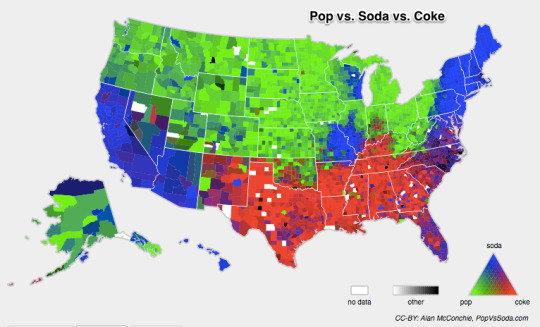
Picture id: Color coded map displaying which U.S.A. regions predominately say pop, soda, or coke.
They say pop!
The further east the Eds are, the more their location makes sense, so I place them in western New York, near lake Erie. It's a rural area with a large city sky line nearby (Buffalo, NY) and there are also Appalachian ski resorts, which would explain the mountain range. There's some swamp land as well, which ticks off all the landmarks seen in the show other than the desert and native peach orchard (though peaches can certainly be cultivated in this biome!)
Also, when looking into travel times in the area, I came across this:

Pictue id: Google map screen shot with a town called Cherry Creek in the center.
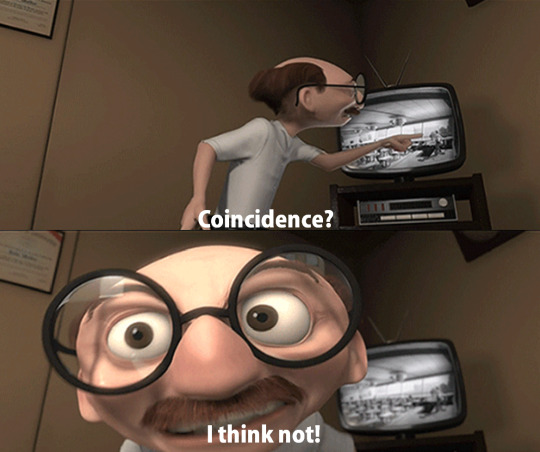
Picture id: Incredibles meme. Top text: Coincidence? Bottom text: I think not!
SO that's my theory. The Eds grew up in rural western New York, close enough to the shore of Lake Erie that they could get there in a day's walk. Thanks for coming to my TED talk, etc. etc.
60 notes
·
View notes
Text
Everyone who grew up with Saturday-morning cartoon television in the 1980s or 1990s is surely familiar with the universe of the Smurfs. During many years of adventures, however, the diet of the little blue creatures remained somewhat of a mystery.
The principal ingredient of many of their dishes was “Smurf berries,” which grew on bushes, but the indistinct appearance of the bushes gave few clues about their botanical nature. This was a deliberate move of the Smurfs’ creator, Belgian cartoonist Peyo (Pierre Culliford, 1928–1992). When the Smurfs were still only a European phenomenon, the Smurf berries were referred to by the French name salsepareille. Peyo chose this name for its exotic sound, initially being unaware that the name referred to very real plants. The name sarsaparilla or salsaparilla, as the plant is known in English, had been used for various species of the genus Smilax for centuries.
When the Smurfs became a phenomenon in the United States, the sarsaparilla shrub lost its berries, because many American viewers were thought to be familiar with sarsaparilla as a real plant. Smilax species are typically climbing vines (not Smurf shrubs) that can be woody, prickly, or both. They appear in tropical and subtropical areas around the world. The fact that an American audience might sooner recognize sarsaparilla than a European audience has everything to do with the plant’s history, which mainly revolves around Smilax species like S. aristolochiifolia and S. ornata, from Mexico and Central America. The best-known episodes from sarsaparilla’s history -- first as a medicine and later as a tonic drink -- are indeed about species from the New World.

The introduction of the Smurfs in the United States signified, in fact, sarsaparilla’s second Atlantic crossing. The oldest references to sarsaparilla are from Old World antiquity, where Smilax aspera was used as an antidote for poisons. The Roman medical writer Dioscorides (first century CE) devoted a chapter to this plant [...]. This description survived many centuries and became firmly embedded in the European medical tradition. [...] When European naturalists explored the plants of the New World in the sixteenth century, they tended to relate new species to better-known plants whenever they could. [...] Nicolás Monardes (1493–1588) described different kinds of American sarsaparilla in his work Historia medicinal de las cosas que se traen de nuestras Indias Occidentales (1565). His descriptions carried a commercial touch. For instance, he tried to convince his readers that the whitish sarsaparilla from Honduras was better than the black variety from Mexico. Similarly, he aimed to embed the new American kinds of sarsaparilla in the traditional framework of European medicine. [...]
The old name sarsaparilla began to be associated not only with new Smilax species from different geographical regions, but also with new diseases. American sarsaparilla was not used as an antidote in cases of poisoning by venomous animals, but to cure syphilis. Syphilis had swept Europe [...], and the market for syphilis remedies was booming. Yet a range of botanical substances had to compete with preparations that contained mercury. The most famous botanical antisyphilitics were of exotic origin: guaiacum wood, China root, sarsaparilla root, and sassafras wood. All these plant parts became staple drugs in European pharmacies [...].
---
Sarsaparilla [...] was also valued as a flavoring ingredient in medicinal tonic drinks, often along with sassafras. As such, sarsaparilla was to enjoy another wave of popularity in a later age. [...] As a medical commodity, sarsaparilla enjoyed great commercial success early on. Between 1568 and 1619 alone, 670 tons of sarsaparilla were imported in Seville, Spain, equivalent to some 7.5 million doses. [...]
In the eighteenth and nineteenth centuries, the borders between medicinal and other uses of sarsaparilla blurred. Proprietary remedies with sarsaparilla abounded, with the Ayer and Hood companies from Lowell, Massachusetts, turning the production of sarsaparilla into big business. In advertisements, it was usually promoted as a tonic, to purify the blood, and to create appetite. Because it was of American origin, it was supposedly especially suitable for American patients.
By this time, then, sarsaparilla had lost many of the Old World medical and cultural connotations [...]. The divide became so pronounced that European fans of the Smurfs in the twentieth century were no longer expected to recognize the name of a plant that had been a mainstay of pharmaceutical practice there for centuries, while the name sarsaparilla lived on as a soft drink in the United States.
---
Image, caption, and all text above by: Wouter Klein. “Plant of the Month: Sarsaparilla.” JSTOR Daily. 16 June 2021. ”Plant of the Month” series is a partnership between Dumbarton Oaks and JSTOR Labs. [Image screenshotted and shown as it appears in Klein’s article, but illustration originally from U.S. National Library of Medicine and in the public domain. Bold emphasis and some paragraph breaks/contractions added by me.]
66 notes
·
View notes
Note
While researching on different religions that exist in the world, I've finally learned what Shinto is about and now I'm starting to see huge parallels to paganism. One thing that stood out to me especially is the shinto understanding of polytheism/animism. It feels a lot more analog to what I've found out about the "historical" pagan views. Meanwhile, modern neo-pagans seem to draw a lot more inspiration from the ancient greek "flavors" of polytheism. Is this something you've thought about before and do you have any opinions to share about it? I'm really just curious if this is something other heathens have noticed/considered/discussed before.
Oh yeah, we've notice it. This happens for a few reasons:
North American society is modeled after Rome. This means we're prone to viewing Grecco-Roman models of antiquity as "the default" way of doing things, so anytime we don't know how to do something (like polytheism) we look to Roman and Greek things first…even when it doesn't apply.
The Classical Model feels familiar. Familiarity is comfy because it begets a sense of competency, and competency begets a sense of authority, and authority is something many neo-pagans wave around like cudgels to hide the fact they struggle with Christian cognitive paradigms…which they struggle with because Christian operant conditioning needs to actively be deprogrammed, and this is hard to access and hard to do. While no one's at fault for wanting to feel secure in their spirituality, it does lend itself to more corner-cutting.
Neo-Völkisch narratives have poisoned the well. The original Germanic Völkisch movement formed the ideological backbone of the Nazi Party. It also infiltrated Heathenry, giving us Folkish Heathenry. It ALSO romanticized the Roman Empire. The way the Folkish approach Heathenry is to take customs of old Norse culture and slot them into a romanticized Grecco-Roman theological model. It's falling out of favor, for obvious reasons, but a number of people still have the impression this is how Reconstructive Heathenry works.
One thing I will say, for the sake of disambiguation for followers, is that while Heathenry and Shinto are both based in animism, Shinto is a centralized religion whereas Norse Heathenry is not.
60 notes
·
View notes
Text

















National Guacamole Day
Learn to make guacamole at home, and discover some of the many versatile uses for this tasty invention, from a simple dip to a sandwich spread and more.
Whether that bright green, creamy and chunky treat is piled on top of a tortilla chip or used as a garnish for a Mexican entree, guacamole is a delicious way to truly enhance a snack or a meal!
History of National Guacamole Day
While the day itself doesn’t exactly seem to have any particularly poetic origin, National Guacamole Day is a terrific excuse to indulge in the tastiest of dips!
However, guacamole itself seems to have its origins with the Aztec people group at some time before the 16th century. Early guacamole recipes only included mashed avocado and it became very popular due to the excellent health benefits of the avocado. Adding in the tomatoes and onions came later, which was a natural development since those are also native to the Americas. Eventually the lime juice was added, which originated in the Middle East but made its way west with the arrival of Christopher Columbus.
The word, guacamole, originally came from the word “āhuacamolli” which translates literally to mean “avocado sauce”.
Not only is it a great addition to a savoury spread, it’s also good for you! This is because “guac” is made from avocados, which are nutrient dense and packed with healthy fats that help the body lower bad cholesterol, all of which contributes to having a good ol’ time and living as long as possible.
How to Celebrate National Guacamole Day
Celebrating this day is easy and can be filled with fun as well as delicious flavors! Enjoy the day with some of these ideas:
Eat Guacamole
Even if there’s no particular reason, other than it being an awesome day, go ahead and celebrate National Guacamole Day by picking up some at the store! Don’t forget to grab something to put it on, such as a bag of tortilla chips, a selection of veggie sticks (carrots, celery or cucumbers), or a piece of tasty toast. Eat it with french fries, slather it on a quesadilla or use it as a filling or garnish for tacos. The options for eating guacamole are virtually endless!
Learn to Make Guacamole at Home
Freshly made guacamole is the most delicious part of this day! All it takes is buying some ripe avocados and making it from scratch at home. Blend the avocado, season with salt and it’s done!
Of course it might be even tastier to add a bit of flavor to it, such as lemon or lime juice for some zesty citrus notes. Or perhaps some tomato, garlic and onion to expand the palette, the choice is completely personal.
Find Creative Ways to Eat Guacamole
Many people associate guacamole only with corn tortilla chips. But there’s so much more to it than that! For those who are trying to get a bit healthier and forego the chips, or for those who are just looking for a bit of adventure, guacamole has a lot of creative ways it can be used for snacks and meals. In addition to using it as a dip, try out these ideas for guacamole:
Spread It On a Sandwich. Guacamole makes a great sandwich condiment. Simply pile it on top of a hamburger or chicken burger for a tasty treat. Guac is also tasty when used as a healthy addition to a grilled cheese sandwich.
Top a Pizza With It. That’s right! A boring pizza can be made delicious with guacamole. Some people like to combine it with Buffalo sauce and chicken as well.
Stuff Mushrooms with It. Keep it vegetarian by filling hollowed out mushrooms with guacamole and topping with a spicy Buffalo sauce. Yum!
Make It Into a Salad. Guacamole can make a healthy and delicious base for a salad. Create a Greek fusion by adding feta cheese, or turn it a bit sweet by piling it up with chunks of watermelon or peaches.
Have a National Guacamole Day Party
Invite friends and family over for a little get together with the intention of celebrating National Guacamole Day. Give a nod to guacamole’s origins by decorating and dressing up in costumes that channel Central American culture.
Of course, the table of refreshments will need to center around the guest of honor–guacamole! But it can be filled with all sorts of other south of the border treats as well. Try offering some tostadas, chips & salsa, taquitos or quesadillas. Toss in some churros or flan for a delicious dessert.
Learn Fun Facts About Avocados
Since they are the main ingredient for guacamole, a fun activity for the day would be to learn a bit of trivia to share with friends or coworkers as National Guacamole Day is celebrated. Try these fun facts to share:
Avocados are a fruit. That’s right, technically guacamole is actually a smashed fruit salad!
Hass Avocados were banned in the US. In an effort to control pest problems, the beloved Hass Avocado was once banned in the United States. From 1914 to 1997, it was illegal to import these delicious fruits. Everyone is much happier now that they are legal again.
The World Record for Guacamole was over 3 tons. Created by a wholesaler in Jalisco, Mexico, this batch of guac took more than 800 people to make it. It contained more than 25,000 avocados, 3,500 tomatoes and 3,000 lemons.
Remember–it’s not necessary to only indulge in this tasty treat on National Guacamole Day. After all, it’s good for you all year round, this is just an extra special reason to enjoy it!
Source
#Steak Taco#Breakfast Club Burger#Motorhead Burger#travel#original photography#vacation#USA#Canada#Spain#Sweden#resturant#food#National Guacamole Day#NationalGuacamoleDay#16 September#tex-mex#sour cream#salsa#Navajo Taco
5 notes
·
View notes
Text
Does anyone else get haunted by the knowledge that in a few hundred years from now (yes I'm gonna be an optimist and hope there will be humans in a few hundred years) that people are going to look back at our written words and laugh themselves silly over what they find? Sure if our digital age continues at least that might be slightly less awful to read but you know the amount of errors and misspellings we do because we've been taught 'hooked on phonics' and what have you. Which might be serviceable for learning how to read but is complete and utter shit for teaching people to spell?
And since we've frankly gotten lazy and so used to our little pocket computers auto correcting our spelling that if we have to actually write something out then we're fucked. So we know this NOW but imagine what people 500 or 100 years from now are going to think when they find exant writing and immediately lose their shit like we do over middle english? (much less old english) The general populace is pretty much oh, look at those silly, quaint and uneducated people putting their ye and their olde's into everything, etc. And like….completely ignoring the fact it was literally just a handful of languages thrown into a stew pot and left to melt into a bastardized version of SOMETHING. So we look at it and it just looks like a typo riddled hot mess to our modern eye.
Now imagine someone finding our exant modern writing examples and tell me they wouldn't do the same thing. All those desperate attempts at phonetically trying to spell certain words and our utter and miserable failures. Not to mention our SLANG, often completely centralized in certain areas. Philly's infamous Jawn comes to mind right off the top of my head. Or AAVE. I'm clearly speaking from a English speaking American POV but I know other languages and cultures have the same fun flavors and things that make language so endlessly fascinating.
Also imagine someone finding our tumblr blogs with our widdle meow meow and our blorbos, our baby girls and any of a dozen weird tumblr specific vernacular which is kinda it's own weird tumblr ecosystem dialect.
These poor bastards in the future are going to be SO CONFUSED. And at LEAST we have a centuries long record of how the English language has evolved and changed over the years to help guide us. But for dead languages or ones that don't have that rich history of documentation? Lets say some awful global event happens and we lose their history, they're going to be even more confused by our little meow meows because maybe something like the knowledge cats = meow survives because it's so prevelant. But why the fuck are we calling these random characters who have no feline features our little meow meows?
So yeah, that's the shit I think about sometimes. And it haunts me.
Also this entire post was brought to you by my struggling for a good four minutes to try and figure out how to spell buoyancy and the many fucked up and terrible attempts I made desperately trying to get close enough my spellchecker would understand wtf I was trying to type only for it to keep suggesting bouncy?
13 notes
·
View notes
Text
one perhaps underrated element of david cronenberg’s style, as exemplified in the dead zone (1983), is his ability to stay incredibly faithful to the tone and style of his source material in adaptation. as with m. butterfly (1993), this film does not bear much of the twisting, surreal, associative qualities cronenberg’s more classic films are known for, and indeed the literary flavor of stephen king is as always strong enough to overlay most other adaptational artistic influences. compared to other king adaptations, though, this film is more concise and cohesive than any i have seen except perhaps for christine (1983), neatly avoiding the pitfalls of excessive meandering worldbuilding and poorly established stakes that dog king adaptations from salem’s lot (1975) to the shining (1980). unlike (for instance) stanley kubrick, cronenberg knows how to step back as an adaptor, and his visual style in this film is unobtrusive and understated, allowing the semi-rural american northeast aesthetic so central to king’s writing to shine through in all its beiges and browns and gazeboes and pervasive fundamentalist christianity. i certainly appreciate the respect he shows for his source in adaptation. however, an element of cronenberg’s style that i wish he had retained in this film is his brilliant skill for depicting the slow detaching of a character’s perceptions from reality—shown off to great effect in videodrome (1983) and dead ringers (1988) and central to martin scorsese’s taxi driver (1976), which shares similar plot devices with this film. calling into question the veracity of the central character’s perceptions would not only establish him as a more effective foil for the delusional politician whom he is convinced he must assassinate, but would also add more urgency to the plot, and more ambiguity to the very pat ending. regardless, the dead zone (1983) functions very well as a king adaptation and shows off cronenberg’s skill for faithful but still artistic adaptation, and is overall a very good film
11 notes
·
View notes
Text
April 3, 1968 • Bookends
On this special occasion, the birthday of this beauty of an album, I'm not only thinking about how great it is. I’m also thinking about my Grandma, and I’ll tell you why via an episode that has stayed with me all this time.
I came to know S&G via my Daddy's audiocassette of Central Park playing in my parents’ car. They knocked me head over feet immediately and I wanted to listen to everything they ever recorded - but we’re talking Italy around 1999/2000, before the internet really was a thing. You had to buy CDs or cassettes, and if you didn’t like ‘em, then what? Lots of money thrown away, so it was basically not gonna happen.
Luckily for me, my Uncle had all the studio albums on vinyl! So I often visited to religiously listen to them on repeat, a goofy 12 yo trying not to scratch them and stuff. I had no idea what the songs were about, I was just starting to learn English, but I was in awe. Those voices! Those sounds!
And the covers of the albums, how unusual they were to my eyes! Not in a bad way, mind you, but so different from what I was used to - I was familiar with Queen, with the Beatles, with lots of other international artists and their pictures, but S&G’s just had their own kind of flavor, if you know what I mean. There were two people and not a whole group, nor a single artist, for a start. They looked so young, so bonded… I didn’t know a thing, I had no idea who they were, but those album covers spoke to me.
The music told me all I needed to know, really. I tried to follow the lyrics on the back of the albums that had them, but of course I barely understood them - too young to get the whole meaning, but I didn’t mind, because I got the vibes.
So anyway there I was, marveling at the beauty of the harmonies and music and curious about who created such a magic. My Granny walked in one day and something upon these lines happened:
"Who are they? What is it they're singing?"
"I have no idea Granny - they're American though, from NYC!"
"Oh yeah? What are they like?”
I picked the albums and we started looking at Bookends because you know, it’s the one where you can see their faces better.
“Do you remember seeing them on TV some time, Granny?”
“Not at all.” She paused to listen, I guess Wednesday Morning was on and Go, Tell It on the Mountain was playing. “They sound meh. But they're very handsome."
"I think they sound great and look meh, Granny."
"Hm. Lemme hear something else.” I have no memory of what I chose, but whatever it was, it won her over. “Well, shame they sing in such a strange language, I can’t understand a word. But you're right, they do sound nice. And you'll appreciate the rest when you grow up.”
And I do believe quite a lot of my problems started that day, lol. Anyway, it’s some sweet memory I felt like sharing. Happy Bookends birthday, my fellow S&G lovers!
By the way, I later discovered my Granny knew both The Sound Of Silence and Mrs Robinson because they were both sang in Italian by Italian artists in the 60s. SOS was turned into a love song, Mrs Robinson kinda maintained a pale bit of the original meaning. Anyway, Granny didn’t care about the lyrics, she was hooked by the music. I particularly remember when she heard S&G’s Mrs Robinson: she looked at me with such happiness in her eyes and agreed that it sounded just great - though she was still annoyed at the language, “Why two handsome boys with such handsome voices must sing in such an unintelligible language!”
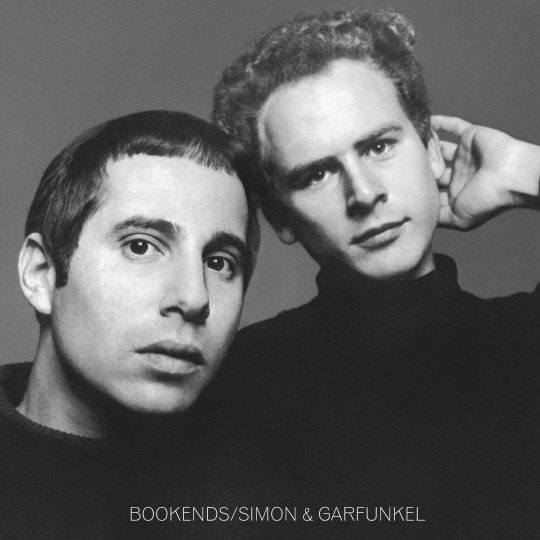
#simon and garfunkel#simon & garfunkel#s&g#bookends#mrs robinson#the sound of silence#art garfunkel#paul simon#paul and artie#old friends#memories#ffs i'm old
8 notes
·
View notes
Note
Does Dan McClellan ever explain how he's a Mormon? I started listening to Data Over Dogma the other day, thanks your regular comments about it, and I'm absolutely boggled that this dude can say this shit and then go to church on Sunday.
he talked about his biography in his Mormon Stories appearance. he converted as an adult, around 19 or 20--he describes himself as feeling kind of aimless in life, having social connections through friends and family members to the mormon church, and being drawn to it that way. inferring a little bit from the context, he seems to have landed within a pocket of mormons that were either pretty pro-lgbt or not strenuously anti-lgbt--enough that that didn't put him off, given his agnostic and not particularly conservative background.
he's an interesting case, for sure! he explicitly avoids talking about his personal beliefs, so i can only guess what his exact though process was. but the impression i get is someone who 1) was strongly drawn to the social aspects of organized religion (and mormonism is very tight-knit socially), 2) was willing to suspend judgement on the more out-there elements of doctrine (the really off-the-wall historical stuff), and 3) isn't too pressed about the truth claims element of religion, or doesn't personally find that the most important part of religious experience and feeling.
and yet it is still kind of strange to me to listen to someone who is very thoughtful about the cognitive science of religion, who deeply understands the textual history of religious scripture, and who understands why you can't use faith-based arguments as part of any coherent methodology in the analysis of that scripture, to try to mount a defense of religiosity in general. i mean plainly people can do it. but i can't imagine how, unless there is some deep cognitive dissonance at work. i think that even if the truth claims of religion aren't the most important part of religion to you, they're plainly incredibly important when it comes to, like, how religious traditions are differentiated--if the truth claims don't matter, there's much less reason to be mormon vs episcopalian vs baptist.
i could see salvaging out of all that some kind of general moral therapeutic deism, or ultra-reformed judaism, or other spiritual-but-not-dogmatically-religious worldview--but belonging to an avowedly dogmatic, hierarchically organized religious institution, with the kind of internal discipline that means members like dan are (let us be charitable) less than entirely open with their criticisms less they face larger-scale social consequences--a problem not even modern Catholics face--and one which is nonetheless built on an unusually recent, and unusually disprovable set of truth claims like mormonism is--like, idk. it's really hard to imagine someone who knew all the stuff he knows about biblical history being drawn to mormonism if he had learned that stuff first. and if that's true that feels kind of like an indictment of the religion? like it really is mostly contingent features we don't care about in any deep way.
that makes more sense for ethnoreligions like judaism, and out of all american religions, mormonism is probably closest to being an ethnoreligion itself. it's pretty culturally insular compared to mainline protestantism. even most flavors of fundamentalist evangelicalism. the closest analogue is maybe the primitive baptists? and they're a tiny denomination. but if it was really a self-sustaining culture it probably wouldn't need a centralized hierarchy that excommunicated dissenters who got too big a public profile for criticizing the church.
19 notes
·
View notes
Text



Exploring Manhattan: The Heart of New York City
Manhattan, the vibrant heart of New York City, is a place where history, art, culture, and commerce converge. With its iconic skyline, diverse neighborhoods, and endless entertainment options, Manhattan offers an experience like no other. Whether you’re visiting for the first time or rediscovering the city as a local, here’s everything you need to know about exploring Manhattan.
1. Iconic Landmarks
No visit to Manhattan is complete without exploring its famous landmarks. The Statue of Liberty stands proudly in New York Harbor, symbolizing freedom and hope. Nearby, Ellis Island shares the stories of millions of immigrants who helped shape the city’s history. Another must-see is the Empire State Building, offering breathtaking panoramic views of the skyline from its observation deck.
Other landmarks include Times Square, known as "The Crossroads of the World," where bright lights and billboards dazzle visitors day and night. Central Park, an oasis in the city's midst, provides a natural escape with walking trails, ponds, and beautiful scenery. For art lovers, the Museum of Modern Art (MoMA) and the Metropolitan Museum of Art are must-visit destinations.
2. Diverse Neighborhoods
Each neighborhood in Manhattan has a unique personality, offering something for everyone. SoHo, known for its cobblestone streets and trendy boutiques, is a haven for art enthusiasts and fashionistas. The Lower East Side showcases the city’s immigrant history with vibrant eateries and cultural sites. For a taste of luxury, visit the Upper East Side, home to upscale shops, fine dining, and classic brownstones.
Head to Greenwich Village for a bohemian vibe with live music venues, quirky coffee shops, and the birthplace of the Beat movement. Meanwhile, Harlem offers rich African American culture, from soul food to jazz clubs and historic churches. Chinatown and Little Italy are other highlights, each offering unique flavors, cultural landmarks, and annual festivals.
3. Entertainment and Nightlife
Manhattan is famous for its Broadway district, where world-class musicals and plays entertain millions. Be sure to catch a show in one of the historic theaters, or, for a unique experience, see an off-Broadway production. The nightlife scene is also thriving, with rooftop bars offering stunning skyline views, jazz clubs in the West Village, and dance clubs in Chelsea.
If you prefer a more relaxed evening, consider a dinner cruise along the Hudson River. You’ll enjoy beautiful views of Manhattan’s illuminated skyline, including landmarks like the One World Trade Center, Chrysler Building, and Brooklyn Bridge.
4. Foodie’s Paradise
Manhattan is a culinary haven, offering everything from food trucks to Michelin-starred restaurants. For street food, try a New York-style hot dog, a classic slice of pizza, or a bagel with lox and cream cheese. Food halls like Chelsea Market and the Essex Market offer international cuisine, artisanal groceries, and unique dining experiences.
If you’re in the mood for fine dining, Manhattan boasts some of the world’s best restaurants. Jean-Georges, Eleven Madison Park, and Nobu offer exceptional experiences for food lovers. And don’t forget the borough's dessert scene: Magnolia Bakery’s cupcakes and Levain Bakery’s cookies are must-tries.
5. Shopping Extravaganza
For shopping, Fifth Avenue is a dream destination, offering high-end brands like Gucci, Prada, and Louis Vuitton. For unique finds, head to the markets in Hell’s Kitchen or the boutiques in NoLIta. And if you’re looking for budget-friendly options, the Garment District has plenty of sample sales and outlet stores.
Manhattan truly has it all—from world-renowned landmarks and diverse neighborhoods to mouth-watering cuisine and unparalleled entertainment. Whether you’re strolling through Central Park, dining in Little Italy, or exploring the art galleries in Chelsea, Manhattan will capture your heart and inspire memories that last a lifetime.
2 notes
·
View notes
Text
a writeblr intro!

oops i’m posting it again... tumblr decided i wasn’t cool enough to actually show up in the tags, alas.
🌹 Liv/Olivia | she/he/they | 23 🌹
Hello 🎉! My name is Olivia (feel free to call me Liv)! I am a Black fantasy & romance author who focuses on themes of queer love & longing, sapphic intimacy, generational wounds & complicated familial relationships.
I also spend quite a bit of time creating digital art! A lot of it revolves around my WIPs these days, lol. You will certainly see art on this blog of my characters. Feel free to check out my art blog @lurrkingly, or my art twitter here.
I am always looking for more authors/writing advice blogs to follow! Fellow writers please feel free to interact! I follow, like, and reply from my main/personal blog, @girlfriend-champion :)
I am always open to ask and tag games!
I am tentatively open to critique partners–if we’re mutuals and we have similar reading/writing interests, please feel free to ask! <3
🌹 about my work 🌹
My writing tends to skew towards adult/emerging adult. I LOVE various flavors of fantasy (high, low, urban, action-adventure, Gothic). I like to spend time crafting intricate worlds (lore bibles are some of my favorite things to write) and magic systems.
My favorite works (to write and to read) all include some form of romance. I write romantic love and attraction between all genders, but ladies craving each other carnally is like music to me. LOL. So, some of my work features sexuality/intimacy, but this certainly varies widely from project to project (and I certainly will not be sharing this sort of content on tumblr, for reasons that should be obvious.lol).
I love to include elements of complex relationships in my writing–romantic, platonic, or familial. Human relationships are complicated and messy and awesome and frequently painful–and it’s important to me that my work reflects that.
I try particularly to explore in my work the lives and relationships of queer women of color (particularly Black & biracial women). I am always open to fantasy, romance, and sci-fi recs written by Black authors :)
🌹 my WIPs + tags 🌹
[More below the cut]
(Including pure writing projects AND art + writing projects)
General tag: #my WIPs
Character art tag: #character art
Weyward Blood (working title – characters & excerpt coming soon!)
Adult, novel, alternate history, Gothic, romance, low fantasy, supernatural, WLW, erotica
In an alternate history set in early modern south-central Europe, three estranged vampire-hunting sisters return to their hometown to attend the funeral of their father–the greatest hunter who ever lived. The sisters must reveal the truth of their father’s death and reckon with the resurrected remains of bygone love… before their city succumbs to the stalking evils.
Currently: [Drafting…]
Tag: #{sanguis in monte}
Taglist:
Sister Hollow (characters & excerpt coming soon!)
New adult, novel, WLW, low fantasy, action-adventure
In a world wherein the psychic theocracy maintains strict harmony by cleansing the masses of negativity and grief, a particularly angry young woman discovers psychic abilities of her own. When her ex-girlfriend steals away a dangerous memory, she must submit to the church’s training in order to reclaim what’s hers, and, along the way, learn what it really means to feel her feelings. For she has much more in common with the ancient and almighty Holy Mother than she could have ever imagined.
Currently: [Drafting - HIATUS]
Tag: #{the rival daughter}
Taglist:
Under the Sun
YA/New adult, short story, LGBT, romance, speculative fiction, eco-fiction
A (tentatively) short story set in the speculative future of a certain metropolis in the American Midwest. After their parents are disappeared by the authorities for eco-sabotage, a teen endeavors to keep their head down and study their way into a better life for their little siblings. They meet a girl with a taste for uncivil disobedience, and the plan goes radically awry.
Currently: [Outlining…]
Tag: #{the daisy and the daylily}
Taglist:
BW (really working title)
New adult, webcomic (?), LGBT, romance, high fantasy, action-adventure, magic
A plucky fire mage loses her elemental abilities when her horns snap in a traumatic accident. She enlists in an empire-wide magic competition anyways. She’s got to win her girlfriend back, after all, before she’s married off to the reclusive prince. And if, along the way, she happens to utterly charm five other competing girls… well. That works, too.
Currently: [Drawing and daydreaming - HIATUS]
Tag: #{matrimonium}
Taglist:
🌹 about me - miscellaneous 🌹
Fun Facts?
I play too much League of Legends
I’m a licensed marriage and family therapist
If left perfectly alone, I will naturally shift to a nocturnal sleep schedule. This not as cool as it sounds.
I like D&D!
Currently reading:
Kushiel’s Legacy - Jacqueline Carey
The Parable of the Sower - Octavia E. Butler
The Ask and the Answer - Patrick Ness (REREAD)
Come as You Are - Dr. Emily Nagoski, PhD (REREAD)
I look forward to getting cozy on writeblr! Feel free to ask me whatever, or interact if you’re looking for new author mutuals! <3
#writeblr#wip-nook#writeblr intro#writeblr introduction#writers on tumblr#writers of tumblr#queer writers#female writers#black writers#writers of color
43 notes
·
View notes